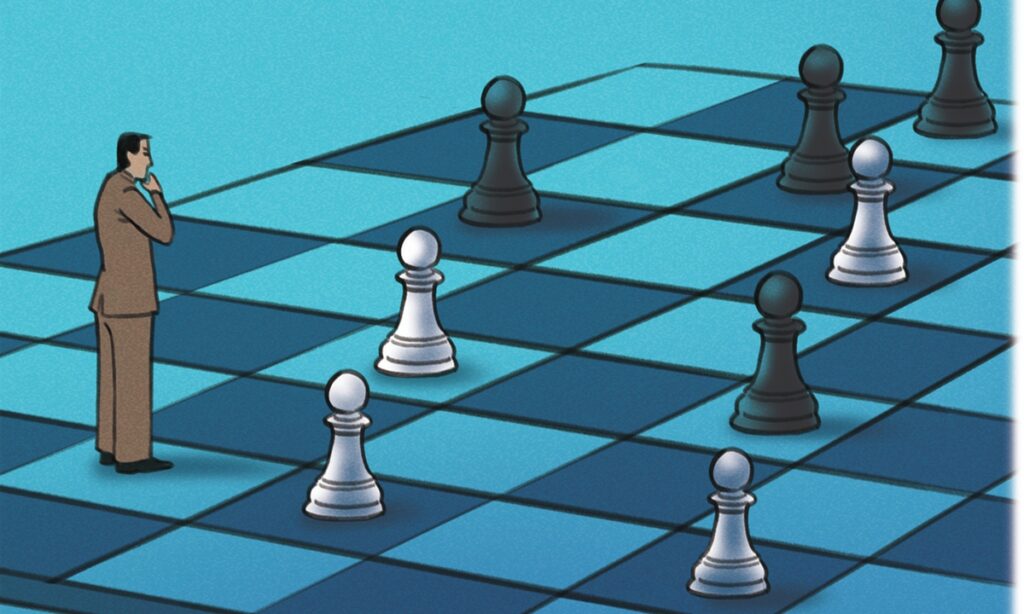The Quadrilateral Security Dialogue (Quad) between the US, Japan, India and Australia, which is described as a mechanism aimed at countering China, seems to have been quiet for months. Since the 2021 second phase of the Malabar exercise in October, no joint moves by the four countries have been reported.
Meanwhile, bilateral cooperation between the four countries has been intense. The annual US-India 2+2 meetings at the foreign and defense ministers’ level are reportedly scheduled to take place in the third week of January in Washington. A virtual 2+2 meeting between the US and Japan just took place last week. And Japanese Prime Minister Fumio Kishida virtually met his Australian counterpart Scott Morrison on the same day.
This is because bilateral coordination tends to be more effective than multilateral coordination. And the Quad itself is a loose mechanism, in which members are hard pressed to reach a consensus on joint action. It is hard for such a bloc to work effectively.
The objective law of a multilateral mechanism is: the more actors, the more divergent interests, and less possibility for them to reach a consensus. It applies to the Quad as well. Frictions among the four countries have been seen, especially between India and Australia. Many analysts describe New Delhi-Canberra relations as the biggest weakness of the mechanism. As Tokyo and Canberra are two of Washington’s closest allies, New Delhi may still be wary of the group.
Furthermore, the four countries have their own China policy and different concerns over how to deal with China. None of them wants to heavily offend China. Under the multilateral mechanism, each country has its own axe to grind, hoping others will sacrifice themselves while it receives gains. All are clearly aware that they will pay a heavy price for a direct conflict with China.
In this context, the four countries cannot coordinate with each other or take pragmatic action. But in the scenario of bilateral engagement, the two actors are more likely to find common interests and execute joint practices.
Additionally, almost every multilateral institution needs strong leadership. The US is at a loss to cope with its domestic issues like racism, gun violence, and political polarization. The US at present is reluctant to offer any actual benefit to its allies and partners as incentive to follow its lead. Against this backdrop, few of its allies or partners are willing to tie themselves to Washington’s anti-China chariot, and the effectiveness and influence of multilateral mechanisms like the Quad are dropping.
Another factor is that Washington is pushing for more bilateral cooperation between its allies and partners. The US is in decline. To contain China, Washington would like to see more bilateral mechanisms between its allies and partners. This will help the US deal with China more efficiently.
Therefore, in the long run, the significance of the Quad is difficult to ramp up. The Biden administration’s Indo-Pacific Strategy is likely to emerge in 2022. By then, the US’ support over the bloc will be louder. Apart from some rhetoric, a series of moves, such as holding summits and joint exercises, will be seen. Other than symbolically, it is difficult to produce any substantial damage to China.
Almost all the countries in the world would like to keep a cooperative relationship with China. They need China’s assistance in a spectrum of issues including pandemic control, economic recovery and financial stability. Meanwhile, the US, the sole superpower in the world, is not willing to offer any economic benefits and even pushes other countries to the forefront of its great power games.
Quad is a security mechanism. The highest form of cooperation in a security mechanism is alliance. It requires a common foe to function. China is the target of Quad, but it is not a foe of any country. Therefore, the security mechanism of Quad will not function at an extreme scale like the confrontation between the US and the Soviet Union. Quad can hardly function as a true alliance and will not have any real impact on China.
The author is deputy director of the Center for American Studies at Fudan University. opinion@globaltimes.com.cn
Illustration: Liu Rui/GT




